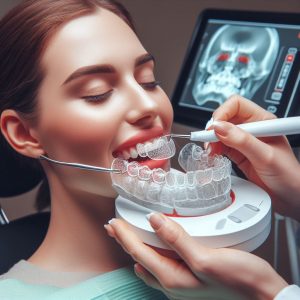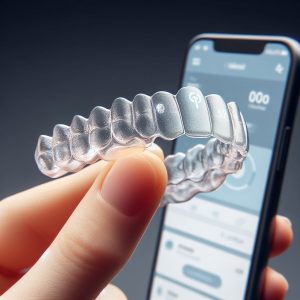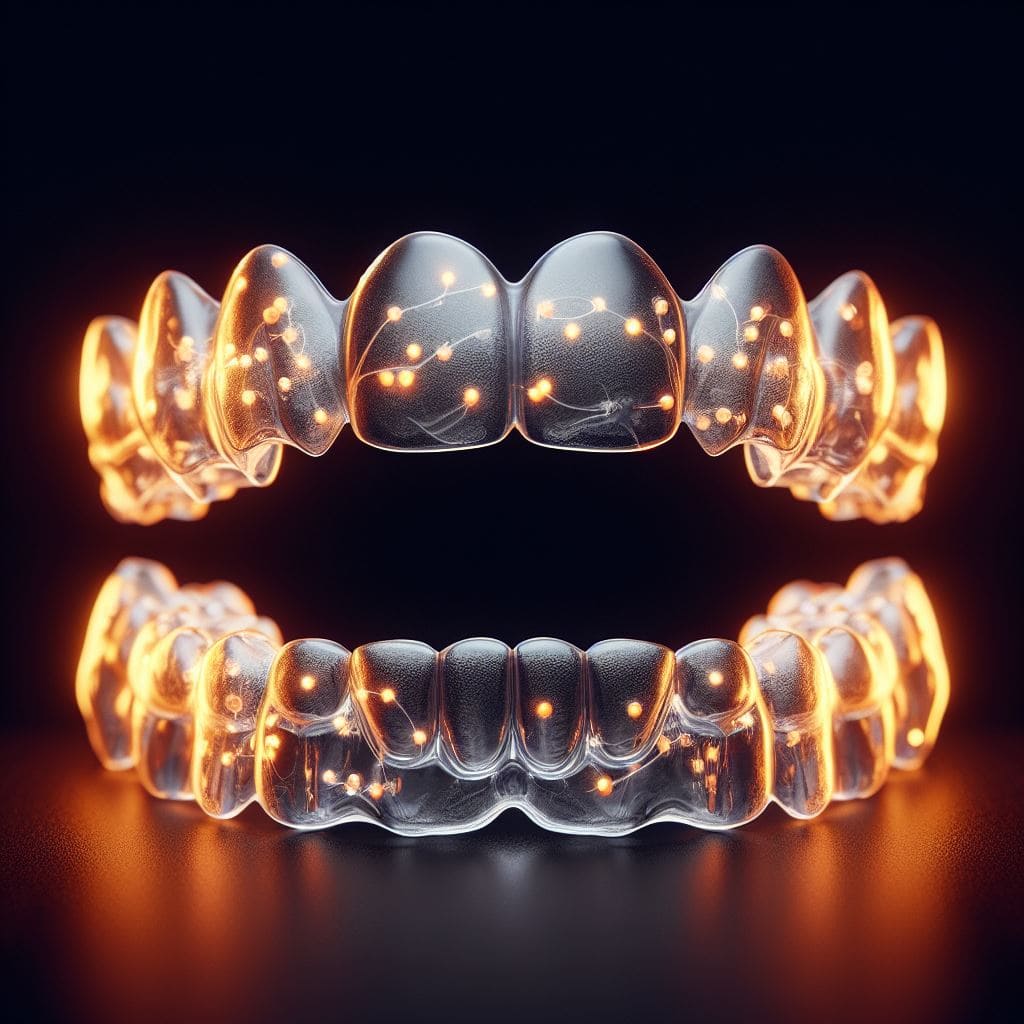Imagine this – you’re attending a close friend’s wedding. The excitement is electric; everyone’s taking pictures of you and the happy couple, but there’s a minor (what always turns out to be a major – sigh) snag…
You’re wearing traditional braces, and they catch every glimmer when you smile. Your orthodontist promised effective teeth straightening but has also – unwittingly or not – introduced an unexpected guest to your life: Shiny metal. 😬
Now, leap forward to today – that same excitement, but none of the embarrassment. Yes, your crooked teeth are still being actively aligned, but only discreetly. It’s your wedding day, and your smile is radiant and unburdened by what you had to previously undergo.
All thanks to…drum roll…invisible braces.
Invisible braces (or ‘clear braces’/‘clear aligners’, as they’re properly called) are the de facto new-age solution to orthodontic teeth-straightening challenges. By their users, they’re called the ‘MUCH less burdensome’ equivalent of conventional braces.
These game-changing correctional appliances have transformed the way we approach dental malocclusion (misalignment) treatment.
They are tailor-made for repositioning your teeth to your natural, beautiful dental structure. Plus, they’re cozy, easily removable, and unassuming. Nobody, unless they’re practically peering down your open mouth (an absurd rarity), would be able to guess you’re wearing them.
Radical, right? 🤓
But how did we come to discover these therapeutic novelties? And why are invisible braces creating such a buzz today in the field – especially in Pakistan (courtesy, in large part, of ClearPath Ortho)?
This article takes you on an engaging journey through the captivating history and evolution of this phenomenon – down to its current standing.
So, kick back, unwind, and let’s dive in.
A lot of you have been asking us for this account – here’s our researched take.
Table of Contents
ToggleAcross Time: The History of Invisible Braces

The history of invisible braces spans (down to the present changing landscape) sizeable chunks of the 20th and early 21st centuries, with roots dating back to the early 1900s.
Visionaries like Hawley shaped the beginnings of what was then an experiment, crafting the earliest dental ‘retainers.’ Orrin Remensnyder introduced ‘Flex-o-Tite‘ in 1924, hinting at the potential for minor tooth adjustments. Harold Kesling’s ‘Tooth Positioner‘ became the standard in 1946, while the innovations of the 1960s included transparent retainers and vacuum-formed appliances.
However, the real breakthrough occurred in the 1990s when technological advancements such as dental 3D imaging and scanning made the manufacture of clear aligners possible.
Align Technology, as a global pioneer, introduced ‘Invisalign’, a system of clear plastic trays that gently reposition teeth. These developments enabled orthodontists to create precise, personalized aligners tailored to each patient’s dental structure and treatment goals.
By 1997, this system was standardized, opening the doors to widespread use in dental practices. Since then, several brands, each with its unique selling proposition (USP), have entered the industry – as they attempt to cash in on the invisible braces rush/consumer preference.
ClearPath Ortho, an FDA-approved manufacturer of clear aligners that caters to a global clientele in addition to its ‘home-base’ patients portfolio in Pakistan, offers one of the more (if not the most) affordable transparent aligner alternatives to the market leader mentioned.
Evolution

The journey of clear braces to the present has been truly remarkable. They’ve evolved into an effective, comfortable, and affordable answer to a wide range of dental misalignment issues, from minor crowding to complex bite problems.
But their beauty even goes beyond that. Clear aligners are pretty versatile and are often used in combination with other treatments like attachments, buttons, elastics, or traditional braces for optimal results.
The orthodontic toolkit, as such, has been expanded through their incorporation.
What’s more, invisible braces prioritize patient convenience. You have options: clear aligners, translucent/colored, or even patterned offerings.
Some – such as ClearPath Aligners – can be removed for mealtime convenience.
Further, tracking your teeth-straightening progress is now a breeze, thanks to online monitoring via mobile apps. And if you need to talk to your orthodontist, remote consultations are only a click away.
Looking to the future, the horizon of clear braces is even brighter. Enhanced artificial intelligence, machine learning, and advancements in biotechnology are all set to further revolutionize their treatment experience.
Here, you want to brace yourself for more personalized, efficient, and biocompatible solutions that adapt to your changing orthodontic needs and the latest trends in oral health.
Totally something worth smiling about. 😊
Invisible Braces Trends in the Making

Here are some key trends and innovations shaping their future:
- AI and ML Advancements: Artificial intelligence (AI) and machine learning (ML) are transforming invisible braces design and production. Several brands are increasingly utilizing AI to create personalized treatment plans, adjusted in real-time using ML feedback. Others employ the same to predict tooth movements with precision.
- Eco-Friendly Materials: Sustainability is in. Biodegradable materials like E-OrthoShape resin from EnvisionTEC decompose naturally after their use, making invisible braces more eco-friendly.
- The Smart Revolution: Smart devices keep you connected with your orthodontist through real-time data and feedback. Some companies offer convenient smartphone apps and scan tools for easy patient-dentist communication and guidance.
- Custom Comfort: Enhance your brace-wearing experience with custom-made plastic accessories for adults and children. ‘Movemints’ (basically medical mints) freshen your breath and aid aligner seating, while OrthoKey provides a hygienic way to remove your aligners.
In recent years, orthodontics in Pakistan has undergone a profound transformation, driven by the growing popularity of invisible braces. Leading the charge is ClearPath Ortho, Pakistan’s pioneer in FDA-approved clear aligner manufacturing, which has been pivotal in bringing this dental ‘straight teeth’ revolution to life.
This transformation isn’t just about introducing a new way of aligning teeth; it’s about empowering people to achieve their dream smiles without the discomfort and self-consciousness often associated with metal braces.
The journey of clear aligners in Pakistan traces back to 2007, when Dr. Waqas Wahab founded the company. It all began with Dr. Wahab’s personal experiences with conventional braces and his unwavering vision to offer a superior, scar-free dental alignment alternative.
The rest, as they say, is history.
Leveraging cutting-edge technologies such as CAD/CAM software, 3D printing, lasers, thermoforming machines, and robotic arms, we create personalized aligners tailored to each patient. But our mission extends beyond innovation.
ClearPath Ortho also educates and supports certified dentists who wish to offer these benefits to their patients, ensuring that everyone can achieve a radiant smile through a comfortable treatment plan.
FAQs
Okay, at this point, now the real question is:
Are you ready to embark on your own straight teeth and smile-transformation journey with invisible braces?
If so, we recognize you might still have some questions or concerns about the treatment.
Here are the answers to some common queries that we keep hearing from our clients.
Do invisible braces actually work?

Invisible braces have a solid reputation for correcting dental issues like misaligned teeth, gaps, and bite problems.
They operate by gently nudging your teeth into their correct positions over time, with noticeable results within a few months.
With proper care, these results are long-lasting.
They’re an excellent choice for most individuals dealing with mild to moderate dental concerns. However, there are a few factors to consider:
- Brace Type: Different brands offer various features that cater to specific needs. Some provide options for minor adjustments, younger patients, and precise tooth movements.
- Orthodontist’s Expertise: Your orthodontist plays a pivotal role in your treatment’s success. They make a custom-made plan tailored to your dental needs, monitor your progress, and make necessary adjustments along the way. Therefore, selecting a skilled and experienced orthodontist is essential. At ClearPath Ortho, we ensure all our panel orthodontists come rigorously certified in our proprietary aligner certification.
- Your Role: Your cooperation is crucial! Adhering to your orthodontist’s guidance on wearing (sometimes for 22 hours), cleaning, and maintaining your invisible braces is of utmost importance. Regular check-ups are also part of the deal.
- Follow-ups: Remember to continue with your retainer treatment if your orthodontist recommends it.
Can you eat with invisible braces?

You can definitely enjoy your meals with invisible braces, but there are some key things to remember:
- Remove Them When Eating: It’s generally a good practice to take out your invisible braces before eating and drinking. This helps prevent any damage to the aligners and allows them to fit comfortably.
- Prioritize Oral Hygiene: After eating, and before you slip those braces back in, it’s essential to brush and floss. This ensures no sneaky food particles get trapped between your teeth and braces, potentially causing trouble. However, this is much easier than the excruciating ‘brackets and wires’ cleaning you’re forced to do with traditional options.
- Mind Your Food Choices: While you can chow down on most foods with invisible braces, it’s wise to steer clear of super hard or sticky stuff that might harm or stick to them.
- Stay Hydrated: You can certainly sip on water with your aligners in place. Just be cautious about sugary drinks and caffeinated beverages (like coffee) that could harm your teeth.
How painful are invisible braces?

Invisible braces are more comfortable because they hurt significantly less than traditional metal braces. Although they typically don’t cause severe pain, you might experience some initial discomfort or soreness during your treatment.
Here’s what you need to know:
- Normal Discomfort: It’s perfectly normal to feel some discomfort when you first start wearing invisible braces or switch to a new set of aligners.
- Duration: The discomfort usually lasts for a few days to a week as your teeth adapt to the pressure from the aligners.
- Management: You can manage the discomfort with over-the-counter pain relievers, especially when you transition to a new set of aligners.
- Mouth Sores: Some individuals might have to use orthodontic wax to counter mild mouth sores or irritation caused by the aligners rubbing against their cheeks, lips, or tongue.
- Speech Adjustments: Initially, wearing aligners may affect your speech, possibly resulting in a slight lisp or changes in pronunciation.
- Progress: It’s essential to remember that any discomfort signifies that your teeth are moving in the right direction.
Your orthodontist will be there to guide and support you throughout your journey, ensuring a smooth process. While you may experience moments of discomfort, the end result—a beautifully aligned smile—is undeniably worth it!
What is the price of invisible braces?

how invisible braces may be cheaper in the long run
The invisible braces/aligners cost structure depends on several factors, including:
- Type of Treatment: Different brands or types of invisible braces come at varying costs. These may range from PKR 100,000 to PKR 500,000 or more, depending on the complexity of your case.
- Treatment Complexity: The severity of your orthodontic issues can impact the cost.
- Orthodontist’s Fees: Orthodontists may charge different fees for their services.
- Location: The location of your treatment within Pakistan or abroad can influence the costs.
- Insurance Coverage: Check if your dental insurance covers orthodontic treatment, as this could help offset the cost of invisible braces.
- Payment Plans: Many orthodontists offer payment plans that allow you to spread the treatment cost over time, making it more budget-friendly.
CONTACT US TODAY!
To get an accurate cost estimate, it’s best to schedule a consultation with one of our certified orthodontists. They’ll assess your unique needs, create a tailored treatment plan, and provide you with the exact price.
In the final assessment, keep in mind that investing in a straighter smile with invisible braces can be priceless for your oral health, personality profile, and self-confidence.
So, if you believe you’re a candidate for teeth straightening (you don’t even need a specialist’s appraisal for this – you just know when your bite doesn’t align), here’s what you need to do:
Fill out the form below ✍️.
And that’s it!
We’ll take care of everything – down to the point where your straightened smile becomes a reality!












2 Responses
I wonder who wrote this blog, really well written.
Post the author, give the credit where it is due.
Thank you for the kind words/appreciation.